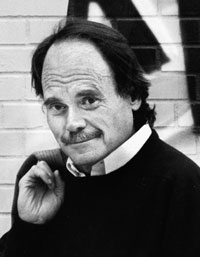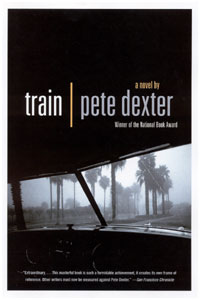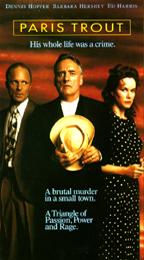
| NYWI HOME PAGE | VISITING WRITERS & EVENTS INDEX | VIDEO ARCHIVES | BLOG |
 |
NYS Writers Institute, Thursday, February 10, 2005
8:00 p.m. Reading |Recital Hall, Performing Arts Center
Pete Dexter, author of six novels, is known for his uncommon mixture of comedy and violence. He often uses the idiosyncratic settings of his stories and unusual characters to heighten the dark humor of the situations that he chooses to write about. 
Dexter's newest novel, "Train" (2003), revolves around an unlikely trio in San Diego. These characters are Lionel Walk, nicknamed Train, a talented young black golfer who caddies for Miller Packard, a white police sergeant. Norah Still, a beautiful survivor of a yacht hijacking becomes a part of the mix, when Packard is sent to investigate the crime scene. The tensions between such diverse characters become increasingly conflated as the novel progresses.
"Dexter explores racism with a cold eye in "Train"--rarely politically correct and always unafraid to find pettiness in the lives of liberal whites, beatniks, philanthropists, and powerful Afro-Americans."
Mixing his trademark dark comedy with characters that are as reckless as they are vulnerable, Dexter weaves together a plot that highlights the social tension of the 50s.  "Paris Trout" (1998), Dexter's third book, won the National Book Award and was shortlisted for the National Book Critics Circle Award. "Paris Trout" looks at how a small town in Georgia during the 50s reacts to the shooting of an innocent girl. The town's white hardware owner and loanshark, Paris Trout, becomes angry when Henry Ray Boxer, a young black man, refuses to make his payments. Trout takes the law into his own hands and ends up killing a young girl who lives with Boxer. Though Trout is convicted of the murder, he doesn't acknowledge that what he has done is a crime and instead bribes his way out of prison and begins to spiral out of control.
"Paris Trout" (1998), Dexter's third book, won the National Book Award and was shortlisted for the National Book Critics Circle Award. "Paris Trout" looks at how a small town in Georgia during the 50s reacts to the shooting of an innocent girl. The town's white hardware owner and loanshark, Paris Trout, becomes angry when Henry Ray Boxer, a young black man, refuses to make his payments. Trout takes the law into his own hands and ends up killing a young girl who lives with Boxer. Though Trout is convicted of the murder, he doesn't acknowledge that what he has done is a crime and instead bribes his way out of prison and begins to spiral out of control.
PARIS TROUT, February 4, 2005
7:30 p.m. Filmscreening | Page Hall, 135 Western Ave. Downtown Campus
"an expertly crafted and bleakly fascinating tale of social conflict and madness in the deep South." - "Publishers Weekly"
Dexter's other novels include "God's Pocket" (1984), which begins with the death of Leon Hubbard, a construction worker in South Philadelphia and then traces back the story and ramifications of this event; "Deadwood" (1986), a story about the American folk hero James Butler "Wild Bill" Hickok as an aging legend and the events that his death brings about; "Brotherly Love" (1993), a novel which traces the not-so-brotherly love of Peter Flood and his cousin, Michael who become targets of separate mob hits; and "The Paperboy" (1995) which traces the adventures of a pair of reporters who investigate, amongst a series of obstacles, the case of an innocent man, Hillary Van Wetter, who is facing execution.
Additional Links:
Pete Dexter Introduction
Times Union Article
For additional information visit www.albany.edu/writers-inst or contact the Writers Institute at 518-442-5620.